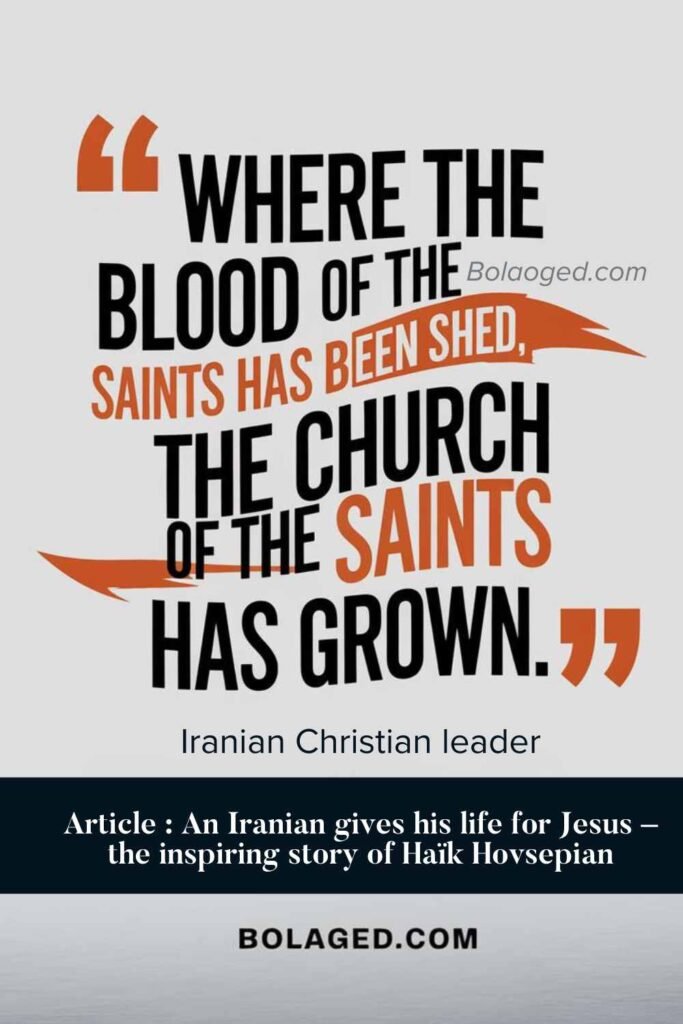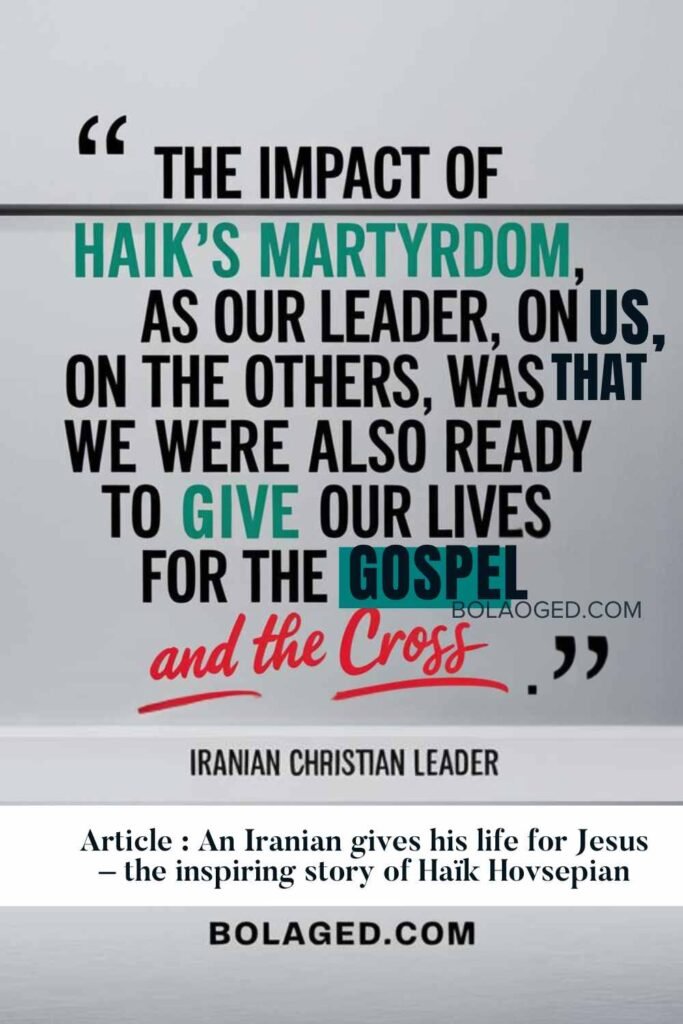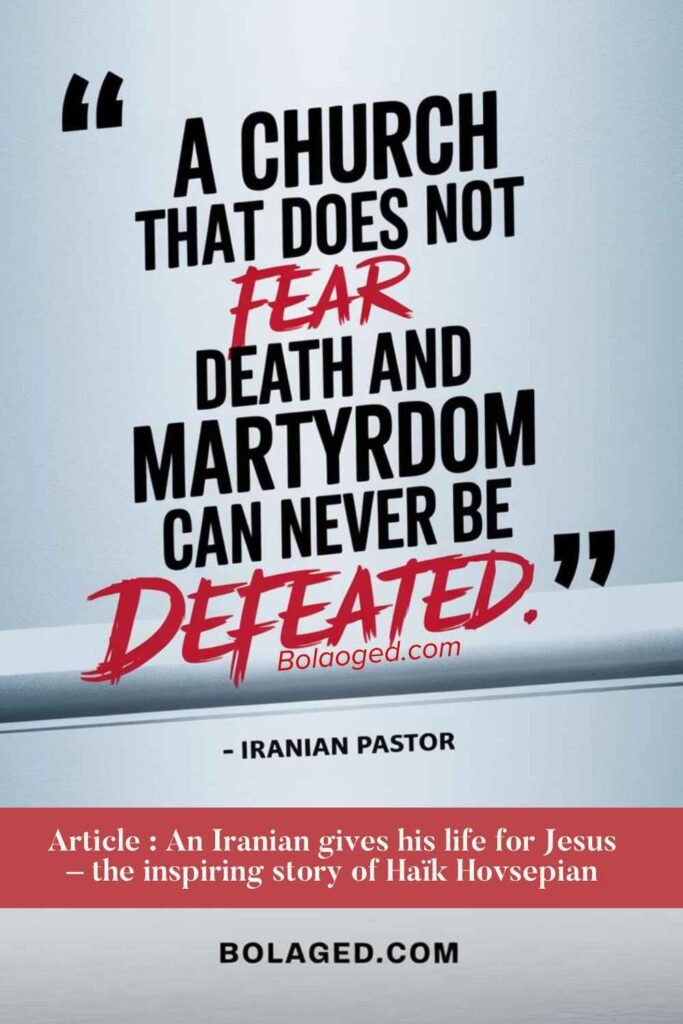Some men’s courage in the face of adversity testifies to their deep faith and the intrinsic value they place on the Gospel. In our age, much of Western Christianity has chosen to cower before the jeers and harassment of the godless and atheistic. It is worthwhile to examine the case of people, often from other climes, who have fully embraced their faith and the attendant suffering. They faced far more difficult circumstances than mere mockery, and they did not bend. Haïk Hovsepian was one of such, and thirty years after his passing, his story still inspires us.
Born in 1945, he felt God’s call to evangelize Muslims from an early age and worked with a missionary couple of the Assemblies of God. Tragedy struck when he and his wife lost their six-month-old baby and the missionary couple their three children in a car accident, yet they maintained their commitment to God’s work. He subsequently planted a church in a predominantly Moslem region which provoked the ire of many local Muslims. His church was almost burnt down, but he persevered. The 1979 Islamic revolution plunged the country into radical fundamentalism. All Christian literature in Farsi (the national language), including the Bible, was banned. A new era of repression began.
An Iranian gives his life for Jesus – the inspiring story of Haïk Hovsepian Share on XDespite the danger, Hovsepian remained unwavering in his dedication to his work. In contrast to the Armenian and Coptic churches, the Assemblies of God consisted mostly of Muslim converts. This was a difficult situation, as churches were now forbidden to accept Muslims in their worship services or as members. He became General Superintendent of the Assemblies of God. Later, when the churches joined forces, he was elected president of the Association of Protestant Churches in Iran. He worked tirelessly to strengthen the faith of Christians during these dark times and continued to preach and win souls.
The Iranian state, in a cynical move, even as it pursued its repressive policies, mandated churches to sign a document acknowledging that Christians in Iran enjoyed full constitutional rights. Pastor Hovsepian declined to sign it. Rather, he produced a document detailing the extensive human rights violations and repressive measures meted out to Christians in Iran. His exceptional courage was evident to the entire world as he stood up for Mehdi Dibaj, a pastor and former Muslim sentenced to death for apostasy. Pastor Dibaj had already spent several years in prison and was due to be executed. Hovsepian boldly publicised this injustice, calling for international support. He was able to garner worldwide attention and support. Under immense international pressure, the regime ultimately yielded and released Dibaj. This was essentially a public humiliation, and many felt they would undoubtedly take revenge in some form.

Three days after this victory, Pastor Hovsepian disappeared. The authorities initially feigned ignorance about his whereabouts. Two weeks later, his son was called to the morgue to identify what might be his body. After looking through several photos of deceased persons, he couldn’t find his father. Then they showed him one last photo, and there he was. The family requested to be handed over his body so they could give him a Christian burial. After acquiring the body, they made a shocking discovery – Haîk Hovsepian had been brutally murdered, with unknown persons stabbing him 26 times. Many countries held funeral services in his honour. He was 49 years old.
After his death, a visibly distressed and emotional Mehdi Dibaj expressed his gratitude to Hovsepian and firmly believed that his death resulted from the courageous stance he took for his own freedom. Tragically, a few months later, Dibaj disappeared and was later found murdered. Hovsepian’s successor suffered the same tragic fate. The reign of terror continued, the authorities persistently denied all involvement, to general disbelief. Hovsepian’s family eventually left the country.
It is vital to talk about men like these in today’s world. The apostle Paul suffered persecution and boldly declared, “But I consider my life worth nothing to me, if only I may finish the race and complete the task the Lord Jesus has given me—the task of testifying to the gospel of God’s grace.” Haïk Hovsepian held this conviction deeply. Unlike many who capitulated to the demands of the Islamic regime to avoid trouble, he stood firm, putting his mission to preach the Gospel above his own safety. According to reports, he wrote a letter the day before his death, in which he stated: “I am ready to die for the cause of the Church so that others can worship their Lord peacefully and without all this fear.”
The death of Pastor Hovsepian and others did not extinguish the fire of Iranian Christians, on the contrary. One pastor said: “The impact of Haïk’s martyrdom, as our leader, on us, on the others, was that we were also ready to give our lives for the Gospel and for the cross.“ One would expect these people to be discouraged. Not so. His courage in the face of death strengthened their resolve. Another leader stated, “A church that does not fear death and martyrdom can never be defeated.”

What are we afraid of today? Why is there such a lack of zeal and holiness in those who have the freedom to proclaim the Gospel and serve Jesus? Men such as these 21st century martyrs honour their God. A woman from Iran, who converted to Christianity in the US after following a pastor’s social media messages, revealed that despite growing up among American Christians and interacting with many, none had ever preached the Gospel to her. In the meantime, our brothers and sisters in Islamic countries face danger and death as they declare Jesus and rescue souls.
The Church is growing weaker not because of persecution, but because of indifference and passivity. This is the evil that is eating away at the Church in the West. We are seeking to be served instead of serving, as we prioritize self-preservation over God’s work and the salvation of souls. We seek to take advantage of God, but we are unwilling to commit our time, lives, and possessions to Him.
As for them, they are willing to lay down their lives for Jesus. Our challenge is to live for Jesus, and not deny Him or His values. Extraordinary things happen when God finds people fully committed to His cause. When His work stalls, it’s because there aren’t enough people willing to follow Him, do His will, and save souls. Another Iranian pastor made this profound statement: ‘Where the blood of the saints has been shed, the church of the saints has grown.’ There is a popular saying that the blood of martyrs is the seed of the church. He gave it another slant.
When Joseph Hovsepian, the son who had identified his father’s body, reached the age his father passed away, he wrote a touching letter. In it, he points out that although his father preached messages and sang songs in their hundreds, his life was the most powerful song and message he ever delivered. A most excellent tribute to a worthy soldier of Christ.

